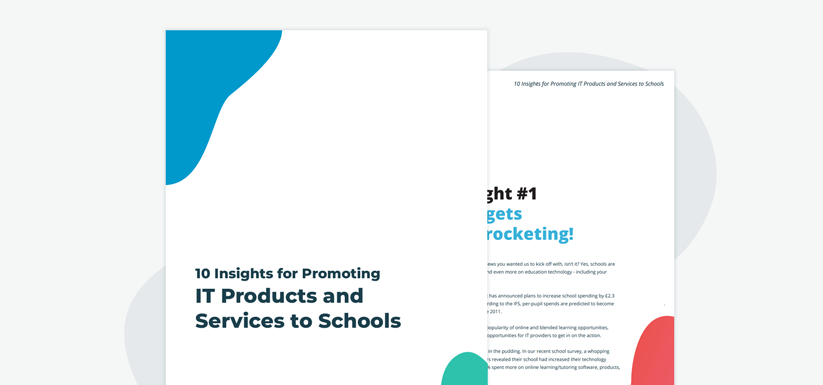Why Our Marketing was Crap
Why Our Marketing was Crap
A confession that dispels the myth regarding the importance of your marketing.
A confession that dispels the myth regarding the importance of your marketing.

A confession.
Last year, Sprint’s own internal marketing was crap.
I didn’t want to use a grade C swear word to describe what we were sending out last year to our clients, but I cant find a better adjective to use.
And it’s my fault!
What can I say in my defence? I was busy? I got complacent? I was too intent on investing my time and energy in our clients’ strategies to ensure they sell more to schools? All true, but hardly an excuse.
So, instead of defending myself, I’m going to use this blog to explain exactly what it was about our marketing last year that was crap and what the repercussions were for our business.
Why was our marketing crap?
I’ve been with Sprint for over six years now.
In that time I’ve got so used to potential clients calling me and explaining how they had loved all the blogs, infographics, whitepapers, and videos we’d sent to them.
Over and over again I’d heard them say how they always knew they’d choose to work with Sprint over any other agency because our marketing stood head and shoulders above anything else they received. I’d heard it so many times I think I started taking it for granted.
So last year, I took my foot off the gas.
If we needed to send out some marketing, I'd rehashed something from previous years or dash off a quick discount offer that I knew would generate a flurry of new leads. Urgh, I feel so dirty just talking about it.
What impact did it have on our business?
For a while, none at all.
The dirty discount emails I was sending out seemed to generate enough leads to keep everyone happy.
In fact, where previously our more educational marketing emails would have a real slow-burn impact, these new emails were generating new leads instantly (even if they were of very mixed quality).
My manager was generally pretty pleased.
But then, after about 6-8 months, those dirty discount emails stopped working. Where they had initially been met with excitement, they were now barely registering a shrug of the shoulders.
Open rates plummeted.
Click-through rates bombed.
Enquiries dried up.
Even worse, where once potential clients were able to hold our quotes up against those of our competitors and deem it a no-brainer to work with Sprint, they were now less convinced.
In their eyes we’d become just another marketing agency (even if, behind the crap marketing we were still smashing it out of the park for our clients).
When did we realise what the problem was?
At first, we looked at a number of different areas of the business in order to try and ascertain why things were getting tougher.
We looked at our lead nurturing processes – this looked fine.
We looked at our CRM – this was efficient and effective.
We looked at our competitors – they weren’t doing anything impressive.
It took a while for everyone’s eyes to turn to me. The Head of Content.
It was obvious right away that I’d massively dropped the ball.
I was livid at myself. After all I spend part of my time advising clients that if you take your eye off your marketing then the knock-on effect to the rest of your business can be monumental. I’d ignored my own advice. A blog I read a while back (I forget which) likened poor/no marketing to that of a disease within a company. It won’t kill it overnight, but if left untreated for too long, it will gradually weaken and eventually kill off a business. Marketing gets taken for granted all the time.
In particular, good marketing gets taken for granted. Those emails and communications that your audience love but that don’t generate an instant surge of new enquiries.
It’s only when you stop creating that great marketing – in fact, several months after you stop creating that great marketing – that you realise just how important it was.
What did we do about it?
Luckily we located this issue pretty quickly, no damage had been done, and we immediately pulled our socks up and made our marketing a top priority again.
We made time where previously there hadn’t been time.
We splintered off into teams to thrash out new plans, ideas, concepts, guidance that we can share with our clients. We drew up a list of topics that our clients needed educating on in order to help them create better marketing to schools.
We made a new commitment to taking more photos of the team, our work, and the fun we have, instead of just recycling photos where our Co-Founder Ben still looks wrinkle-free and fresh faced!
We decided to take a few more risks. Write blogs about stuff that other companies would shy away from and issues that real education businesses experience everyday (like this one!). Use words like ‘crap’ where previously we might have tried to over-impress you with some meaningless highfalutin marketing jargon.
The impact was quicker than we could have hoped. Within just 8 weeks we were not only back on track but outperforming previous years. January was our best ever January, and we’ve already achieved our best ever February (the month isn’t even over yet)! Open rates increased steadily and then dramatically.
Click-through rates went through the roof.
Clients started calling us just to tell us how much they’d enjoyed reading one of our blogs. Like it used to be.
We recaptured what had made Sprint so goddam special in the first place.
What’s the lesson to learn from this blog?
Because there has to be a lesson, right?
Everything we do now in terms of marketing must have a take-away that makes our clients think about their own marketing. Some value that helps them improve how they sell to schools. Well, last week I received an email from a client due to launch their first ever strategy with us next month, only to inform me that they had decided to pull the plug because they’d had a slow start to the year and wanted to save money. Their marketing was the first thing that they had decided to cull. This hit me like a wet kipper around the chops! I knew from first hand experience that marketing is paramount to a business surviving, and thriving. If this client was struggling, and they had decided to cancel all future marketing, then how could they ever expect to generate new sales and recurring business, the two elements that would guarantee a safe path through a difficult sales period?
After reading this email I felt inspired to write this blog and share this simple lesson - Don’t do what I did!
Don’t take your marketing for granted. Don’t pass it off as a luxury as opposed to the necessity that it is. Don’t settle for anything less than remarkable marketing. Even if it feels like nobody will notice if you drop your effort levels slightly. Even if it feels like the great marketing you do doesn’t seem to generate the instant leads you (or your bosses) hoped for.
Your audience will notice if you let your standards drop. Not right away, but soon enough.
And then gradually everyone else in the office will start finding that their lives are getting tougher, they’ll start to leave you out when making a round of coffees, not invite you to after work drinks, the phone won’t be ringing as often, you’ll start losing business to competitors where you wouldn’t have done before.
Some people think marketing is a luxury. It’s not. It’s the thing that keeps the lights on. The thing that everyone overlooks until it’s too late.
Don’t do what I did. Do great marketing, and do it often.
Tags
Database of Schools
Education Marketing
Email Marketing
Similar Articles


Why Email Marketing Wears the Crown in 2023
Learn why email marketing is the number-one method of generating leads and making more sales with schools (including the must-know statistics for 2023).


Marketing IT Products and Services to Schools
Learn 10 game-changing insights especially for IT product and service providers to enhance your education marketing campaigns when emailing schools.


Expert marketing to schools support and solutions
Expert marketing to schools solutions
Email Head Teachers, Teachers, and Staff Inboxes
Email teachers and staff inboxes
Sell More to UK and Global Schools and Colleges
Sell more to schools and colleges

































